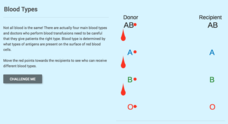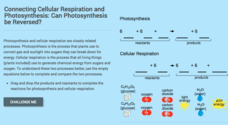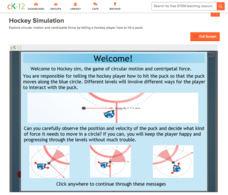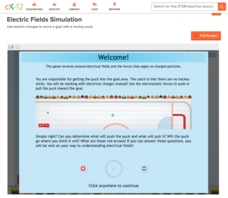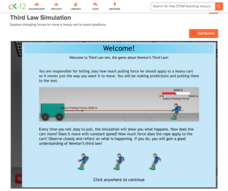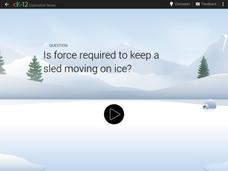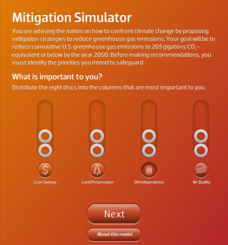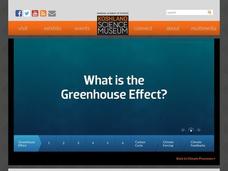Polar Trec
Bioaccumulation of Toxins
In 2015, Peter Cook found that sea lions with high levels of exposure to toxins suffered permanent brain damage if they survived at all. Scholars learn about the accumulation of toxins at various levels of the food chain. Using...
Polar Trec
Touring the Poles
Would you want to vacation in the Arctic or Antarctic regions? Scholars research both regions and produce a travel brochure trying to convince tourists to visit. The project focuses on the geography, climate, flora, fauna, and indigenous...
CK-12 Foundation
Resistor Simulation
Many scholars struggle to picture electrons traveling in a circuit but understand water going through a pipe. The simulation compares circuits to water pipes. It walks pupils through four levels of questions, allowing them to switch...
CK-12 Foundation
Capacitor Simulation
The camera flash works based on a simple circuit, but why does it require a capacitor? Scholars work through two levels of simulations related to circuits and capacitors. The pupils first use a simple circuit with a battery,...
CK-12 Foundation
Blood Types
Does your blood type matter? The video explains the four main blood types and the importance of knowing blood types when performing transfusions. The interactive reviews the information with a quick graphic organizer and questions.
CK-12 Foundation
Natural Selection: Of Seasons and Species
Do predators look for different things in different seasons? The quick interactive shows how some species survive longer in one season than another based on the conditions. The challenge questions encourage pupils to demonstrate that...
CK-12 Foundation
Natural Selection: Natural Disasters
Can natural disasters alter natural selection? The interactive explores this concept with mice living through a forest fire. As the environment changes, the camouflage also changes. How does this one disaster impact future generations?
CK-12 Foundation
Passive Transport
Some molecules move through a membrane with diffusion while others require protein channels. The video and interactive discuss both types of passive transport. Challenge questions allow scholars to demonstrate their understanding.
CK-12 Foundation
Cellular Respiration: Can Photosynthesis Be Reversed?
Cellular respiration and photosynthesis relate closely, but many don't realize how. Scholars drag and drop the reactants and products to the chemical reactions for both processes. Then they answer three multiple-choice questions.
CK-12 Foundation
Power and Efficiency Simulation
How much energy in Jewels does it take to tow a car up a slope? Scholars explore different values of both kinetic and potential energy to answer that question. Through multiple levels, the difficulty increases — as does your young...
CK-12 Foundation
Oscillations Simulation
What makes a swing go back and forth like a pendulum rather than going all the way around? Scholars use the simulation to explore pendulums and how they work. They vary the weight, length of the rope, and even gravity in various trials.
CK-12 Foundation
Hockey Simulation
Do you understand the science behind hitting a hockey puck to control the direction it moves? Pupils experiment by telling a hockey player how to hit the puck so it moves in a circular direction. Through manipulating the velocity and...
CK-12 Foundation
Cannon Simulation
Fire in the hole! Thrill your classes as they see what it's like to fire a cannon ball. Scholars practice aiming a cannon ball by altering first the firing angle, then the velocity, and finally both simultaneously. Can they discover the...
CK-12 Foundation
Electric Fields Simulation
Can you get the puck into the goal using only electric charges on the ice? Scholars experiment with electrostatic forces as they determine which charges pull the puck and which repel it. Multiple levels reinforce different related...
CK-12 Foundation
Electric Ice Sheet
Tommy is trapped on an ice bridge and needs you to balance the charges so he doesn't fall into the icy water! Scholars apply Coulomb's Law, which relates to both the strength and the distance between charges. They work with these two...
CK-12 Foundation
Energy Conservation Simulation
Does the amount of a roller coaster's energy change as it goes along the track? Scholars investigate when a roller coaster has potential and kinetic energy. They observe the changes as it goes up the initial hill follows it throughout...
CK-12 Foundation
Third Law Simulation
Keep calm and use the force! Joey pulls a cart and scholars adjust the force required to control the movement. Through simulating different scenarios, participants learn about Newton's Third Law. It includes analysis questions throughout...
NOAA
Where There's Smoke, There's ...
A remotely operated vehicle approaching a volcano was engulfed by molten sulfur where the plumes of fluids contained the highest concentrations of aluminum ever recorded. This isn't science fiction or an April fools joke, though it did...
CK-12 Foundation
Free Body Simulation
To show the magnitude and direction of all forces acting upon an object, scientists use a free body diagram. This simulation serves as an introduction to free body diagrams allowing scholars to build their own. Pupils select the proper...
CK-12 Foundation
First Law Simulation
Does Newton's First Law of Motion explain how to move a sled across ice? A simulation encourages scholars to decide if they should push, pull, or apply no force. Their decision moves a sled across the ice and to the home at the...
National Academy of Sciences
Mitigation Simulator
The United States has more per capita emissions than any other country in the world. An eye-opening simulation encourages users to explore environmental goals and factors that affect climate change by balancing different priorities....
National Academy of Sciences
CO2 and Temperature
Scientists can model global surface temperature with and without considering human emissions, but does do these factors really make a difference? Two interactive graphs demonstrate some factors that affect climate change. The first graph...
National Academy of Sciences
What is the Greenhouse Effect?
The greenhouse effect warms up earth enough so it can support life, but if it heats up too much, life won't be able to survive. An interactive presentation covers the greenhouse effect, the carbon cycle, climate forcing, and climate...
American Chemical Society
Energy and Entropy of a Stretched Rubber Band
Stephen Perry invented and patented the modern rubber band in 1845. Young scientists put his discovery to work as they use rubber bands to observe entropy and enthalpy. They determine the change in free energy to figure out if it...






